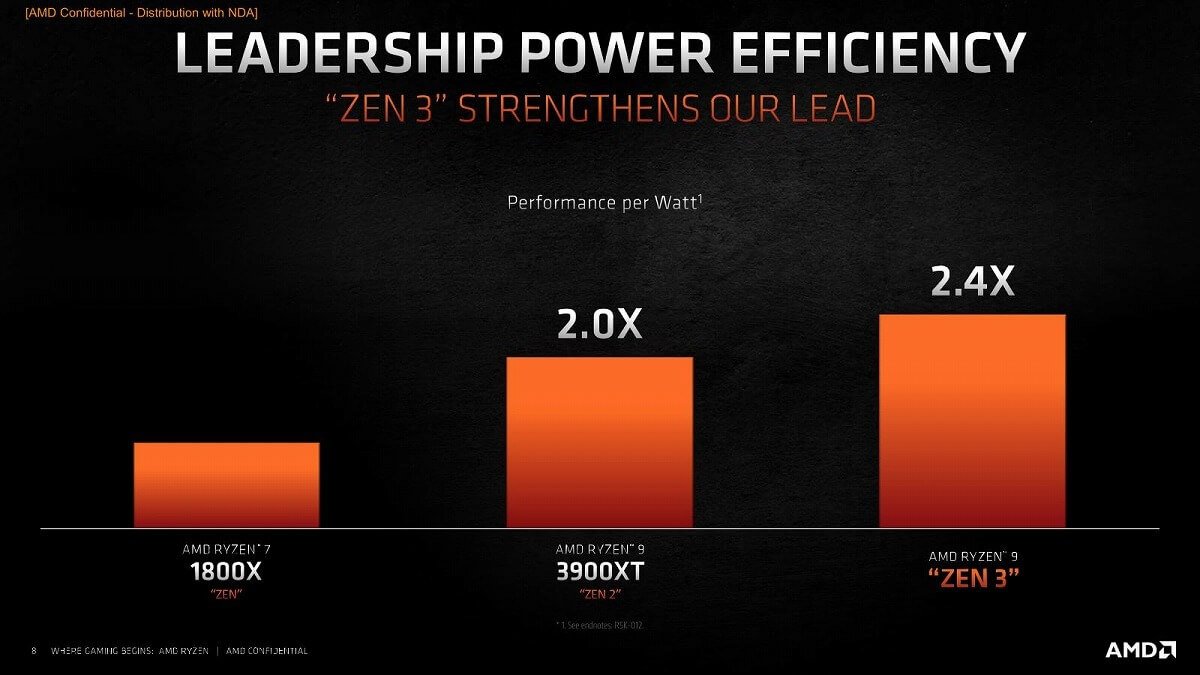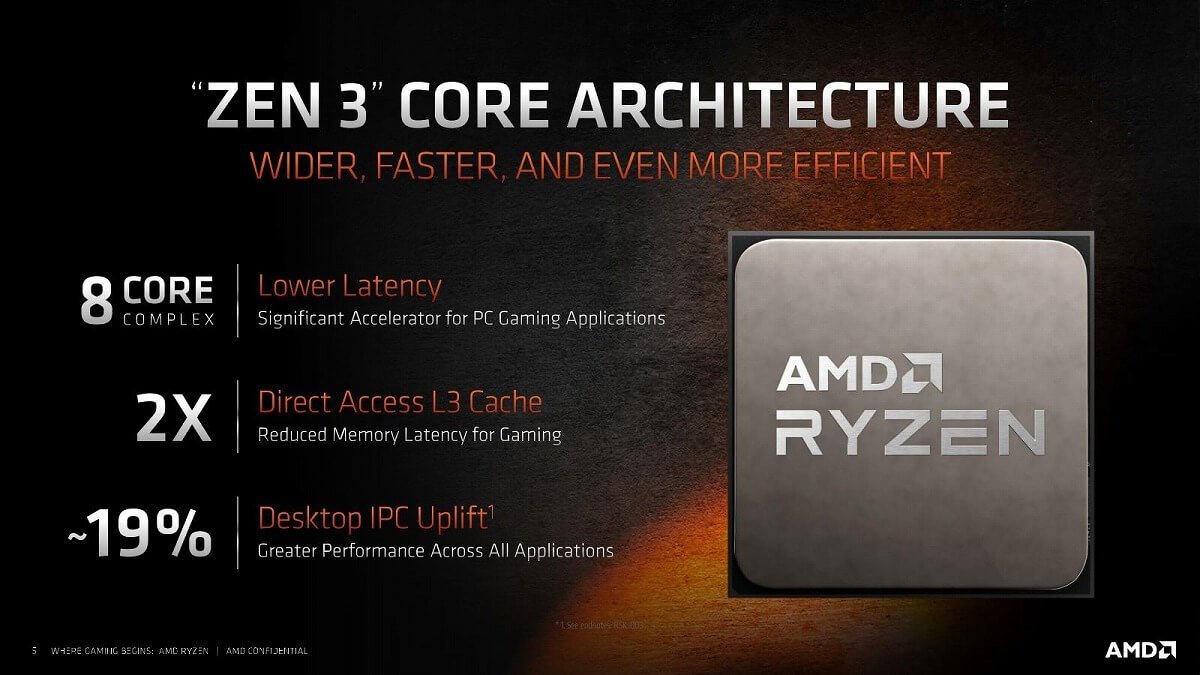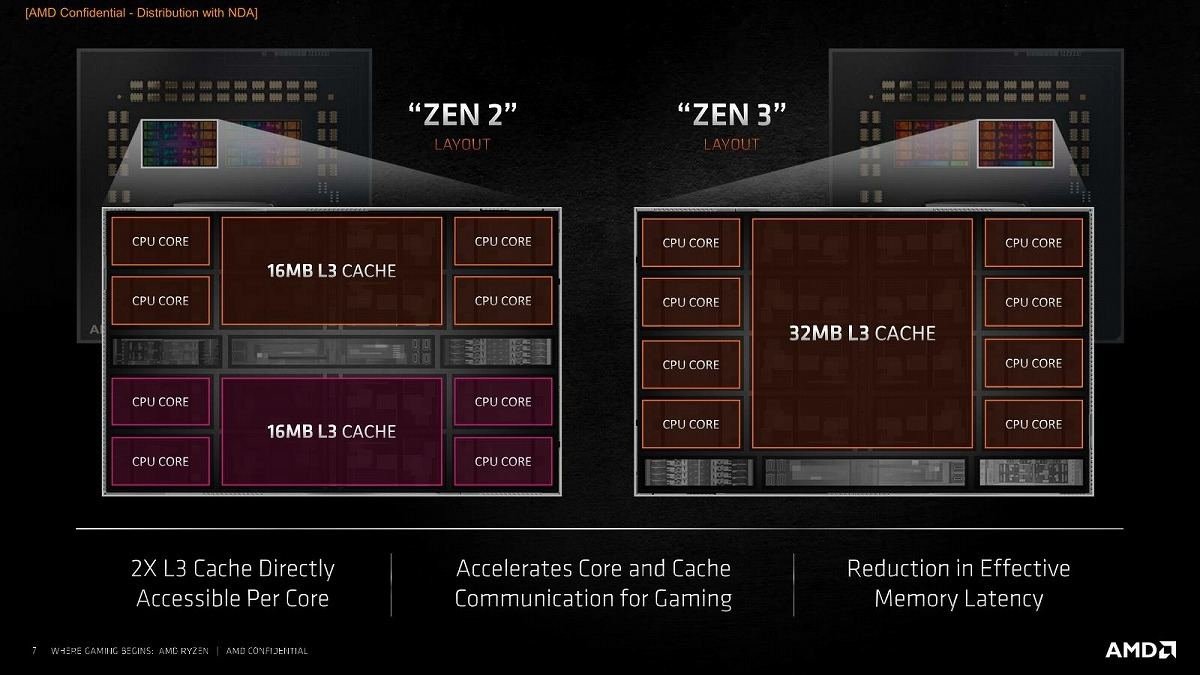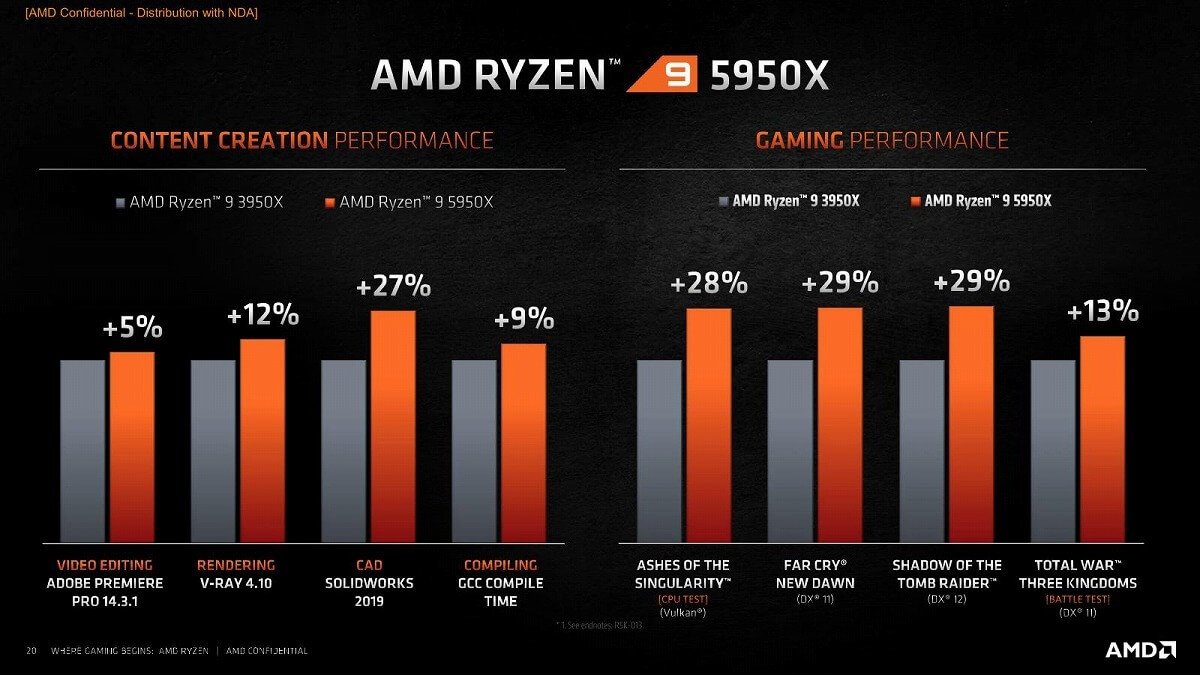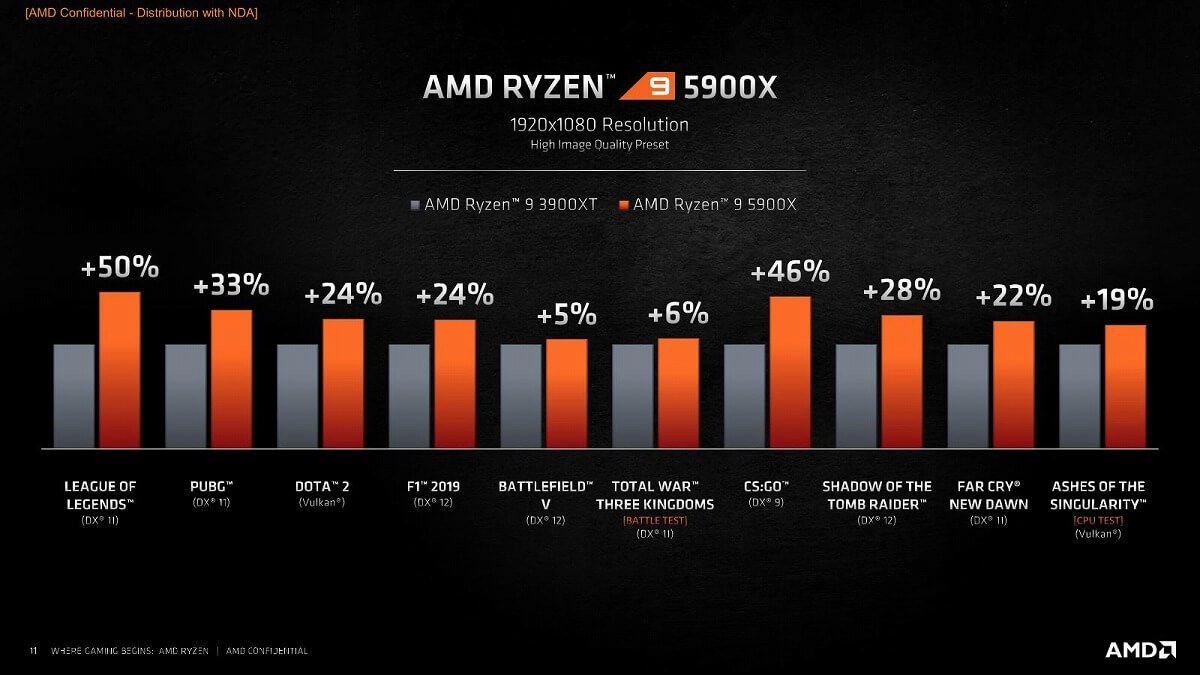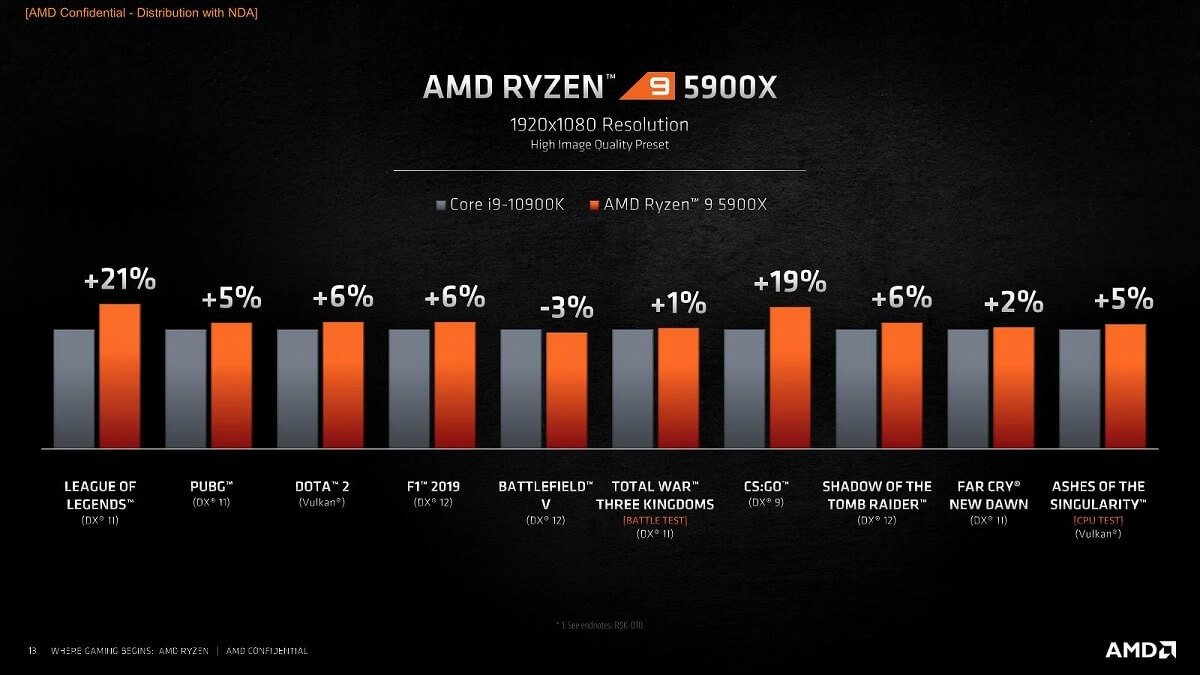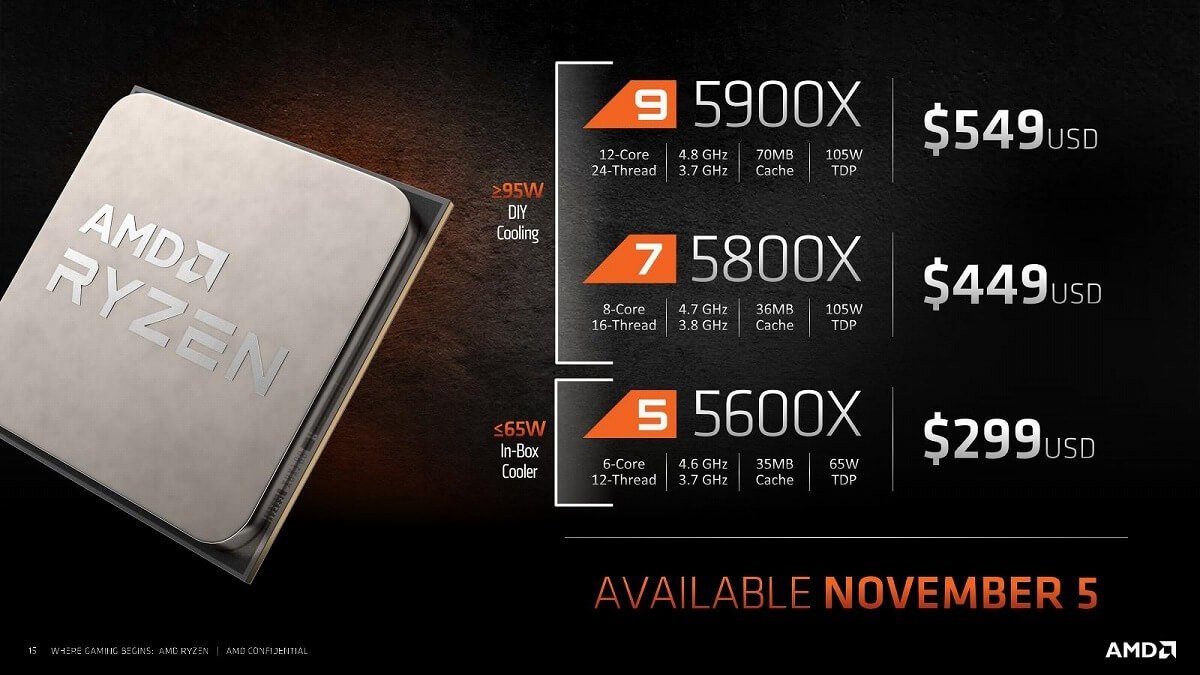After the anticipated waiting, AMD has officially unveiled its latest generation Zen 3 processors, now officially known as the Ryzen 5000 series. AMD unveiled four new processors called the Ryzen 9 5950X, the Ryzen 9 5900X, Ryzen 7 5800X, and the Ryzen 5 5600X.
As the name scheming goes by, AMD decides to skip the Ryzen 4000 naming for its desktop processors, since it was already released as laptop processors. The new Ryzen 5000 series Vermeer processors are the direct successors of the AMD Ryzen 3000 series processors. With respect to performance, the new Zen 3 architecture delivers an impressive 19% improvement in IPC over the previous Zen 2 architecture. On the contrary, the Zen 2 had a 15% IPC uplift over the original Zen architecture. AMD also improved the performance-per-watt up to 24% higher when compared to the previous Zen 2 architecture. AMD manages to deliver these new changes while keeping the 7nm fabrication process.
AMD mentions that the new Zen 3 architecture is redesigned from the ground up, featuring a new unified CCX wit 8 cores for each CCD. The previous Zen 2 had two CCX’s for each CCD and each core complexes had four cores. The L3 cache, which was 16MB for each CCX on the Zen 2 layout, is now unified and totals to 32MB L3 cache on a single CCX of the Zen 3 layout. AMD says the unification of the memory and core complexes reduces the latency and boosts the communication between the cores and cache memory. The 2x L3 cache is also directly accessible and is shared for each core. The new CCX modules can run on the single-threaded mode (1T) or two-thread SMT mode (2T) and with up to 16 threads/complex.
Among the newly announced processors, the new Ryzen 9 5950X is the fastest of the bunch, featuring 16 new Zen 3 cores that come with a base clock speed of 3.4 GHz, and can fire up to 4.9 GHz boost clocks. The chip packs a total of 32 threads and features a total L3 cache of 64MB. The previous AMD Ryzen 9 3950X came with a base clock speed of 3.5 GHz and boost clocks of 4.7 GHz. You can see that the new Ryzen 9 5950X gets a 200MHz increment in boost clocks over the Ryzen 9 3950X to reach the 4.9 GHz boost clocks. We hoped that the new AMD Zen 3 could reach beyond the 5 GHz boundary since the Intel Core i9-10900K maxes out at 5.3 GHz.
The TDP of the Ryzen 9 5950X is 105W, which is the same as the previous generation. The new Ryzen 9 5950X also brings in up to 27% improvement for content creation and 29% performance improvement for gaming over the Ryzen 9 5950X. AMD also boldly claims that the Ryzen 9 5950X is the fastest gaming processor, overtaking the Intel Core i9-10900K up to 59% for content creation and up to 11% faster gaming performance.
Then comes the Ryzen 9 5900X that is the direct successor of the Ryzen 9 3900X processor. The new 5900X processor comes with 12 cores and a total of 24 threads, operating with a base clock speed of 3.7GHz and can shoot up to 4.8 GHz boost clock speeds. The TDP is once again 105W. The older Ryzen 9 3900X came with boost clocks that topped at 4.6GHz and the recent Ryzen 9 3900XT has a boost clock of 4.7 GHz.
The new Ryzen 9 5900X is able to deliver up to 50% performance uplift for gaming at Full HD resolution when compared against the Ryzen 9 3900XT processor. And when pitted against the Intel Core i9-10900K, the new processor delivers up to 21% better gaming performance at Full HD. AMD also demonstrated the CineBench R20 performance of the Ryzen 9 5900X processor that easily crushed Intel’s fastest chip with a really impressive 631 points of single-thread performance, which is a first in the world.
AMD also unveiled the Ryzen 7 5800X processor, featuring a total of 8 cores and 16 threads. The clock speeds are tuned at 3.8 GHz for base performance and boost clocks up to 4.7 GHz. The previous model could top up only up to 4.5 GHz boost speeds and had a 3.9 GHz base clock speeds. AMD claims that the new Ryzen 7 5800X brings in single-core performance-per-dollar improvements up to 9% and multi-core improvements up to 11% when compared to the Intel i7-10700K processor.
And with the Ryzen 5 5600X, the chip can deliver up to 19% single-core performance improvement, 20% better multi-core performance, and 13% better gaming performance at Full HD resolution, when compared to the Intel Core i5 10600K processor. The Ryzen 5 5600X processor packs six cores and twelve threads, with its base speed clocked at 3.7 GHz and boost clocks at 4.6 GHz speeds. While all the newly announced Ryzen processors feature a TDP of 105W, the Ryzen 5 5600X processor has a TDP of just 65W.
AMD also mentions that the new Zen 3 processors will be compatible with all AMD 500 series chipset motherboards. However, users will need to ensure that the BIOS of these AM4 motherboards should be at least AGESA 1.0.8.0 or higher for POST and boot. AMD claims that users should upgrade to AGESA 1.1.0.0 for the best experience. As for those who own AMD 400 series AM4 motherboards, AMD mentioned that they are working with motherboard partners to develop the new BIOS, and the new beta releases should roll out from January 2021. It’s interesting to note that AMD did not announce a Ryzen 7 5700X processor, which could have been the successor of the Ryzen 7 3700X.
The AMD Ryzen 9 5950X processor is priced at 799 dollars (Approx. 3000 AED ), the Ryzen 9 5900X processor for 549 dollars (Approx. 2100 AED ), the Ryzen 5 5800X for 449 dollars (Approx. 1700 AED), and the Ryzen 5 5600X for 299 dollars (Approx. 1100 AED). The new chips will be released on November 5th, 2021. However, we have yet to receive the official price and release dates for the Middle East.
Press Release
AMD has today introduced the highly anticipated AMD Ryzen 5000 Series desktop processor lineup powered by the new “Zen 3” architecture. Offering up to 16 cores, 32 threads and 72 MB of cache in the top-of-the-line AMD Ryzen 9 5950X, AMD Ryzen 5000 series processors dominate in heavily threaded workload and power efficiency, while the AMD Ryzen 9 5900X processor offers up to a 26% generational uplift in gaming performance.
With extensive improvements throughout the core including a unified 8-core complex with direct access to 32MB L3 cache, the new AMD “Zen 3” core architecture delivers a 19% generational increase in instructions per cycle (IPC), the largest since the introduction of “Zen” processors in 2017.
“Our commitment with each generation of our Ryzen processors has been to build the best PC processors in the world. The new AMD Ryzen 5000 Series Desktop Processors extend our leadership from IPC, power efficiency to single-core, multi-core performance and gaming,” said Saeid Moshkelani, senior vice president and general manager, client business unit, AMD. “Today, we are extremely proud to deliver what our community and customers have come to expect from Ryzen processors – dominant multi-core and single-core performance and true gaming leadership – all within a broad ecosystem of motherboards and chipsets that are drop-in ready for AMD Ryzen 5000 Series Desktop Processors,” Moshkelani added.
“Today, we are extremely proud to deliver what our community and customers have come to expect from Ryzen processors – dominant multi-core and single-core performance and true gaming leadership – all within a broad ecosystem of motherboards and chipsets that are drop-in ready for AMD Ryzen 5000 Series Desktop Processors,” Moshkelani added.
AMD Ryzen 5000 Series Desktop Processors
Featuring a remarkable 19% IPC increase over the prior generation in PC workloads, the “Zen 3” architecture pushes gaming and content creation performance leadership to a new level that reduces latency from accelerated core and cache communication and doubles the directly accessible L3 cache per core while delivering up to 2.8X more performance-per-watt versus the competition.
AMD 500 series motherboards are ready for AMD Ryzen 5000 Series desktop processors with a simple BIOS update. This broad ecosystem support and readiness includes over 100 AMD 500 series motherboards from all major motherboard manufacturers. AMD Ryzen 5000 Series desktop processors announced today are expected to be available for purchase globally on November 5, 2020.




